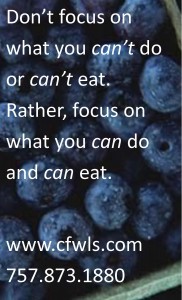 Protein is essential with any weight loss plan. Protein is essential for muscle and tissue growth and repair. If you reduce your caloric intake without consuming the necessary amount of protein, your weight loss will be a combination of lean body mass and fat loss. With adequate protein intake (and exercise), you should be able to preserve your muscle mass, allowing the majority of your weight loss to come from fat stores. If, over time, you do not meet your daily protein needs, you may experience fatigue, loss of lean body mass, and possible hair loss.
Protein is essential with any weight loss plan. Protein is essential for muscle and tissue growth and repair. If you reduce your caloric intake without consuming the necessary amount of protein, your weight loss will be a combination of lean body mass and fat loss. With adequate protein intake (and exercise), you should be able to preserve your muscle mass, allowing the majority of your weight loss to come from fat stores. If, over time, you do not meet your daily protein needs, you may experience fatigue, loss of lean body mass, and possible hair loss.
You will need to check with your surgeon, but we recommend that our patients take in at least 90-100 grams of protein every day. As your weight loss continues, your body will still prefer using your lean muscle as a source of energy. Therefore, consuming 90-100 grams of protein daily will be a goal throughout your weight loss journey, not just during the beginning phases.
Once your weight has stabilized and you are in a maintenance phase then protein requirements may decrease somewhat into the 60-90 range depending on your weight and overall muscle mass. The higher your weight the more protein you may require in order to maintain Lean Body Mass. Men typically require more protein due to their higher total Lean Body Mass.
People seeking medical or surgical weight loss often have many questions surrounding protein intake since it is important for both situations. How many kinds of protein are there? Where can I find it? How much do I need? What is the best time to have it? Let’s try to give some straight forward answers to these questions.
The word protein is derived from the Greek word proteios, meaning “of the first quality”. Protein is essential for life (i.e. we can NOT survive without it!!!) because it contains sulfur and nitrogen, two vital elements for every cell in your body. Protein also helps produce enzymes and hormones, maintain fluid balance, and regulate numerous vital functions, from building antibodies to building muscle. The body maintains roughly 50,000 different protein containing compounds, forming the building blocks of muscle, bone, cartilage, skin, hair and blood.
As far at your diet is concerned, there are numerous kinds of proteins, each with their own set of advantages. The right kinds can make all the difference, especially if you are trying to lose weight and build muscle. Some of the best protein comes from food. Meat has about 7 grams of protein/oz., large eggs about 7 grams of protein, and milk about 8 grams of protein/8oz. In a weight loss plan, you have to watch all the extra calories (fat, carbs) that come with food sources of protein.
- Whey Protein: Whey protein is derived from milk (remember Little Miss Muffet and her curds and whey?). Many whey protein supplements have had most of the excess fat, cholesterol and lactose removed. Whey proteins are undoubtedly the most commonly used and most popular protein used in sports nutrition and with good reason. They are the highest quality protein available with an excellent balance of essential amino acids. Whey proteins are very efficiently absorbed and this is extremely important but this is also a potential problem. Because whey protein is so efficiently absorbed (i.e. absorbed quickly) it tends to not keep you feeling full or satisfied for any extended period of time. For this reason, it also tends to work better if used in small doses (10-20 gms) taken multiple times throughout the day. Your hunger can potentially return faster than with other proteins. This brings us to Casein protein.
- Casein Protein: Casein protein is also derived from milk (the curds part of curds and whey) and is essentially whey’s counterpart. It also is a very high quality protein with all the essential amino acids. While whey is absorbed very rapidly, casein forms a slow digesting gel in your stomach. This in turn promotes a feeling of fullness that can stave off hunger for longer periods of time. This steady stream of amino acids helps to protect against muscle breakdown. A good casein based protein supplement made specifically for weight loss is Weight and Inches (29gm protein/serving) which can be obtained from CFWLS.
- Egg Proteins: Egg proteins digest at a moderate pace. Eggs are an excellent protein source and mimic the amino acid profile of muscle quite nicely. Unfortunately, eggs do have a relatively high amount of cholesterol and also arachodonic acid (mainly in the yolks). Some people are very sensitive to arachodonic acid worsening inflammatory processes. Egg proteins in supplement form (usually as albumin) have had most of the cholesterol and arachodonic acid removed.
- Soy Protein: Soy protein is also digested at a moderate pace. Soy protein contains all of the essential amino acids, but since soy is a plant, it tends to not have quite as good of a ratio of essential amino acids as dairy or egg based protein. Therefore, it does not tend to protect muscle mass quite as well. It can still be a good alternative for those who do not tolerate dairy based proteins.
As far as timing goes, ideally you should use smaller doses of protein multiple times throughout the day. This is especially important after weight loss surgery so even these recommendations will need to be altered somewhat during the phase immediately following surgery. Starting the day off with a good dose is always a good idea (i.e. that protein shake in the morning). An example would be 20-30 grams at breakfast, 20-30 grams at lunch and 20-30 grams at dinner. Then add two 10-20 gram snacks, appropriately spaced between meals. Positioning a protein snack prior to and immediately after strenuous exercise works extremely well to build/preserve muscle mass.
After surgery, your new stomach pouch will initially only be able to hold about 1-2 tablespoons (15-30cc) of fluid at a time. This is approximately ½-1 medicine cup. Your new stomach should eventually stretch to accommodate 6-8 ounces (3/4 to 1 cup) within the first 1-2 years after surgery. Because your new stomach pouch is so small, you need to follow the guidelines provided by your surgeon to ensure the fluid/food you put in your stomach is the most nutritious possible and does not overfill your small stomach, causing you pain and/or nausea/vomiting.
For delicious recipes that provide adequate protein and are low carb, visit us on Pinterest at: CFWLSVA






 Cat Keller has a wealth of experience in marketing, e-marketing, advertising and customer service and manages our Weight Loss Nutritional Store. She is always planning something fun and exciting. special events, discounts, giveaways – it’s never a dull moment. She is happy to help you with questions you may have regarding our products or services. Cat is a graduate of William & Mary, where she studied Government/Pre-Law and minored in Marketing.
Cat Keller has a wealth of experience in marketing, e-marketing, advertising and customer service and manages our Weight Loss Nutritional Store. She is always planning something fun and exciting. special events, discounts, giveaways – it’s never a dull moment. She is happy to help you with questions you may have regarding our products or services. Cat is a graduate of William & Mary, where she studied Government/Pre-Law and minored in Marketing.